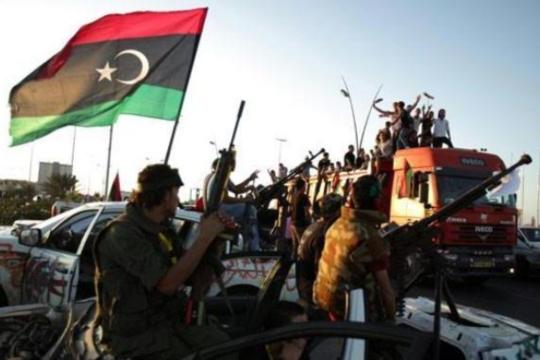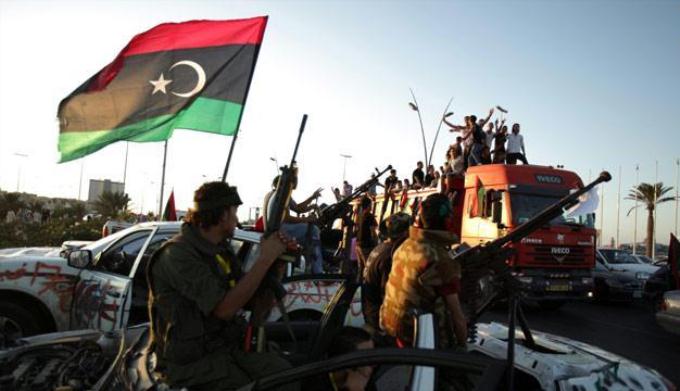
 |
|
Libya's armed struggle a major factor impeding chances of successful dialogue [Getty Images] |
| Abstract As analysts and observers attempt to parse out the intricacies of the current Libyan conflict, the United Nations is sponsoring a dialogue to bring together the warring parties and attempt to find a political solution. This paper proposes that while there are factors which increase the likelihood of successful dialogue, the reality is that internal disputes within each of the political parties, as well as regional and international attention to other, more pressing matters, mean that the dialogue is actually an uphill battle. |
Introduction
The UN-sponsored political dialogue in Libya, supported by the West, comes at a very complex time. Control of the country is divided between two legislators, two governments and two militias, each of which seems intent on imposing its own will. The dispute over transition and rebuilding the country has spiralled into intense tribal, regional and ideological polarisation that endangers not only national unity, but the very social fabric of the nation.
The beleaguered country’s three de-facto regions are now caught in the clutches of a vicious civil war, with the most brutal fighting in Benghazi after retired general Khalifa Haftar launched Operation Dignity. Some of the city’s neighbourhoods are reduced to rubble; schools, universities and hospitals have ground to a halt; and the city continues to suffer a severe shortage of fuel, cooking gas, electricity, and basic goods. Elsewhere, battles rage between the Tuareg and the Tibu peoples; and between the Operation Libya Dawn forces and tribal militias in the south and south-west of the capital Tripoli, though not as vicious as battles in Benghazi.
Leon’s approach: negotiate, drop weapons
UN envoy Bernardino Leon’s approach to dialogue centred on the warring sitting down at the negotiating table, with the hopes that they might lay down their arms and opt for a political understanding that would end the conflict. Closely monitoring the situation are western powers who have issued many joint statements about their own visions for a solution to the crisis. In line with these, Leon is urging the warring parties to agree on a coalition government that would be given a mandate to run the country until a constitution is ratified and democracy is restored through parliamentary and presidential elections.
Thus far, it seems that the pressure has been effective in reaching consensus on how to appoint a head for the coalition government. Leon’s latest suggestion is the formation of a temporary supreme council headed by an independent, with four members of parliament and four representatives from the General National Congress who enjoy the support of military and civilian factions. Once this council has appointed a prime minister for the coalition government, it would automatically disband.
Similarly, Leon asked elected mayors, tribal leaders, military commanders, party leaders, and even independents, to partake in the dialogue; but without clarifying what their roles would be, such as whether they would have a say in how the prime minister would be selected, or whether they would be talking about issues and causes that fall outside the interim government’s authority. Issues such as a road map, the position of rebel forces, the political isolation law and national reconciliation are subjects of ongoing disputes.
Options for political parties
At first glance, the various warring parties’ attitudes towards Leon’s approach pose considerable challenges that may thwart efforts towards peaceful resolution. As mentioned, Leon invited several parties to partake in the dialogue, including representatives from parliament, the General National Congress, local councils, partisan leaders, civilian activists, and independents, but the lack of clear-cut standards of selection caused controversies over some of his selections. Moreover, the inflexibility of each of the warring parties has prevented any progress. Thus far, they have failed to agree on having a dialogue in the first place, and it has proven to be virtually impossible to align their priorities, terms and conditions for the dialogue.
Within the Tobruk camp, differences over political vision have caused cracks in the front that supported Operation Dignity, consisting of members of parliament from two main blocs. The main political blocs within parliament want to fortify the parliament’s legitimacy in order to maintain its status as the country’s supreme authority, while independent members of parliament favour General Haftar’s plan to form a so-called “supreme military council”, which would be mandated to manage the conflict without reporting to a civilian authority. This dispute has coloured the behaviour and attitude of each group towards the dialogue: the supporters of parliament continued to participate in the Geneva talks and demonstrated flexibility towards the UN envoy’s proposals, while Haftar’s forces violated the previously- agreed truce and continued with their military offensive.
In the Tripoli camp, on the other hand, the dispute, though less intense, is still likely to escalate. Most members of the General National Congress agree with the Libya Dawn forces, which are wary of the dialogue process. They stipulated their own conditions which they consider non-negotiable but which are incompatible with Leon’s approach. The primary condition is their utter rejection of Haftar’s participation in the dialogue, and their insistence that negotiations must be based on the Supreme Court’s ruling that the parliament should dissolve – which, in their view, means that all parties should go along with this.
However, some members of the General National Congress have been less stubborn regarding these conditions, and their stance is shared by some other MPs who boycotted the sessions in Tobruk but participated in the first dialogue session in Ghadames during October.
Haftar’s position on dialogue
The dispute over Operation Dignity arose because the military leaders of Operation Dignity believed that the parliament, and the caretaker government it had put in place, did not place sufficient priority on the military operation in Benghazi – which is their excuse for their failure to take control of the city. It’s no secret that the rift between the two sides has been growing, to the point that Abdullah al-Thani, the Prime Minister of the provisional government, and his minister of defence, were banned from entering Benghazi. Operation Dignity’s supporters across the country’s eastern quarter have demanded the dismissal of al-Thani, pushing for parliament to endorse a supreme military council.
Thus, Haftar found himself in a dilemma. He is fervent in his bid to control Benghazi and wipe out the Shura Council of Benghazi Revolutionaries, in the hope that his army would become the only force in Burqa and thus boost his position to negotiate. Consequently, he hasn’t shown much enthusiasm for the dialogue process, since agreeing to negotiate without having control of Benghazi might hamper achieving his goals. However, he does need to maintain closeness to the dialogue process to avoid antagonising the international community and the West, which explicitly condemned Haftar’s transgressions in Benghazi in their latest statement in December.
Haftar’s forces have suffered numerous losses, with many troops coming from regions and tribes that have shown strong support for him. Therefore, it would be difficult for him to convince them to continue supporting him if he leans towards negotiations and agrees to a deal that may not be in their favour.
Chances of dialogue’s success
Internal differences within each of the parties to the dialogue remain the greatest challenge to progress. Because the strategies of each side are still highly militarised, and because they still wager that they can force their will upon others through military victories, especially now that things have come to a showdown, the leaders of Operation Dignity are betting on Benghazi. The recent changes in military leadership seem to point in that direction, and the intensified military action in the heart of Benghazi reflects a desire for a decisive victory before Haftar and his supporters come under sufficient pressure to force them to stop.
Conversely, Operation Libya Dawn wants to control al-Watya military base south-west of Tripoli, so as to neutralise the tribal army and the remnants of the al-Qaqa and al-Sawaeq brigades by confining them to Zintan. They also want to put an end to Ibrahim Jadhran’s control over the seaports and oil fields. However, the reality is that they are expending all their energy trying to achieve quick results on the ground, to no avail.
Factors which may make dialogue successful
• The fervour with which sections of the divided public had supported the warring parties has rapidly been waning, and public desire for the dialogue to succeed has increased dramatically due to the devastating effects of the drawn-out hostilities.
• Fighting forces are all but fatigued from the never-ending hostilities and the sheer geographical vastness of the warzone, especially now that winter has set in, blanketing vast expanses of the country in biting cold.
• Controlling the foreign allies of the warring parties, which support them with weapons and ammunition, may possibly help bring the conflict under control.
• The recent dramatic fall in oil prices has dealt a severe blow to the overall quality of life in the country, and has constrained the ability of warring factions to fund their hostilities, especially in terms of being able to pay their fighters.
• Naturally, the international community, and especially certain countries that have common interests with Libya, have a vested interest in the dialogue’s success.
The best course of action for dialogue
The ongoing dialogue will achieve little on the ground so long as the hostilities continue. Strategically ensnared, there are no guarantees that Operation Dignity and Operation Libya Dawn forces will stop fighting any time soon, since each of them believes that they need to make ground advancements so as to guarantee stability. Since the West is unable to adequately justify military intervention in order to force the warring parties to stop and allow room for their agreement to be brought into effect, the current chances for dialogue’s success appear to be slim.
In theory, there is still potential to create circumstances in which a dialogue could succeed, based on a possible consensus among the tribes and regions. If the tribes and regions can be convinced to agree, they would be able to pressure the two military operations to cease and come to terms. However, the deep rifts among the tribes and regions, and their involvement in the armed conflict, make achieving such a consensus very difficult.
Conclusion
Given the UN mission and Leon’s approaches to the dialogue process, it appears that conflicts among the warring parties preclude any possibility for a resolution, especially given the total absence of any indicators that the two major warring parties might possibly be interested in successful dialogue. Whenever supporters of either side demonstrate interest in dialogue, an internal conflict arises that changes the course of the dialogue, which has yet to begin in earnest. Many of those concerned with the Libyan issue in general, and the dialogue in particular, believe the dialogue’s success hinges on the seriousness of the international community and its ability to pressure all internal and regional parties that are indirectly preventing the dialogue from proceeding. Since the international community currently has too many other challenges on its plate, such as Daesh (the Islamic State), the Russia-Ukraine conflict, and Iran, it may have limited ability to concentrate on Libya in the short-term. However, should the Libyan crisis escalate, as it could at any moment, it could extend into the rest of the southern Mediterranean and provide a hot spot for the existing and burgeoning jihadi groups. At that point, senior members of the UN Security Council would be forced to return the Libyan crisis to the top of their agendas.